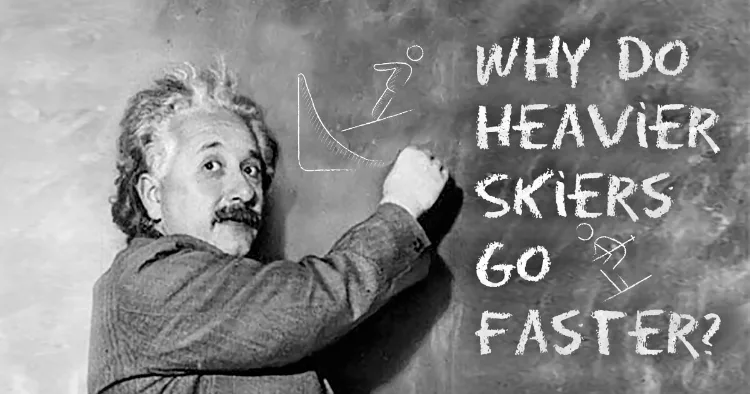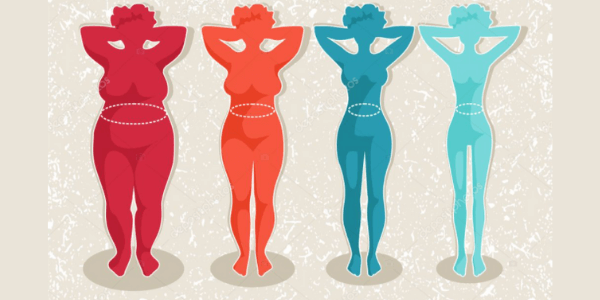Why Do Heavier Skiers Go Faster? (Basic Physics)
by Frank V. Persall
Have you ever watched a heavy-set skier shooting down the slopes?
If you have, you will be familiar with just how quickly they glide down the piste.
Moreover, if you are a lighter person, you might have wondered how you can get your speed up but simply can’t go as fast as those bigger guys and girls.
Contents
But why do heavier skiers go faster?

Much of this is to do with basic physics. The heavier a person is, the less air resistance there is in front of them as they ski down the mountain.
It is for this reason that it is important to know your weight before you start skiing as this will help you determine your potential top speed.
In addition to this, you will also be able to better select the right skis to maximize your performance.
How Does Weight Affect How Fast You Ski?

Imagine taking a feather and a rock and throwing them off a balcony; which is going to hit the ground first? The rock, right?
This is largely because it is much heavier and therefore does not suffer from as much air resistance as the feather. The same applies to people when skiing.
The main drag on a skier as they glide down the mountain is air resistance.
For heavier people, this is less and so they can build up faster speeds. However, the friction between the skis and the snow also plays a part in how fast you can ski.
Therefore, there is a limit to how heavy you can be before friction takes over and begins to slow you down again.
Generally speaking, anyone weighing up to around 200lbs will ski much more quickly purely because of less air resistance.
However, once your weight exceeds this, the pressure on the skis causes greater friction against the snow and this might almost act as a brake.
There is a good degree of physics jargon associated with ski speed but this can get very confusing.
If you’re interested in this, then there is a very interesting set of equations in this explanation.
Knowing Your Weight For Skiing

As if there wasn’t enough to think about when skiing, we are now going to tell you that you must know your weight before buying skis.
This is because different skis are designed with different riders in mind and buying skis for a heavier person when you weigh very little won’t help your performance.
But it isn’t only speed that is affected by your weight. Many other facets of skiing will be affected according to what you weigh.
The Length Of Your Skis
When you choose a set of skis, the length needs to be in line with your weight and this is largely to do with friction, as we discussed earlier.
Skis for a 300lb person will benefit from longer skis that will limit the amount of friction against the snow which will, in turn, help to improve their speed.
This is especially important when you are skiing on soft snow as there is more chance that the skis will plow into the snow as opposed to gliding on top of it, as they are meant to.
However, if you are skiing on heavily compacted snow or even over ice, then much of the friction is naturally lost anyway.
Using longer skis will essentially reduce the pressure per square inch and allow for a much smoother performance.
One thing you should keep in mind when using longer skis, however, is that they are more difficult to turn which is an important consideration for slalom skiers.
Does Skiing Have A Weight Limit?
For heavier people, there may be the concern that they are too big to ski.
However, there is not a weight limit placed on skiing. That said, when looking at ski charts, you will probably find that the maximum weight goes up to around 230lbs.
But this doesn’t mean that you can’t ski. There are some resorts that will place restrictions on whether or not you can ski according to your weight, but these are generally pretty generous. You should check with a resort before booking just to be sure.

Moreover, a lot of people become worried that they may be too heavy for the ski lift but in reality, these are incredibly robust pieces of equipment.
Different lifts are designed to carry different weights but in many cases, they are designed to carry between two and eight people which means that, even if you are overweight, it’s unlikely that you’ll be eight times the ideal weight. The lift will carry you safely.
Conclusion
When you watch skiers whizzing down the slopes, it’s not hard to see that they can reach some astonishing speeds. But different skiers will reach varying speeds according to their weight?
This is because of air resistance. As a person moves down the mountain, the air in front of them creates resistance but a heavier person will be able to push back against this more easily and so their speed builds as a result.
However, since heavier people also put more pressure on their skis, this means that there is greater friction against the snow.
As a result of this, those over 200lbs, roughly, will lose the advantage of greater weight.
One of the most important things concerning weight is that you choose the right skis.
In terms of length, lighter skiers won’t need skis that are quite as long as someone who weighs a little more.
Related Posts:
 |
 |
 |
 |

About Frank V. Persall
Frank is originally from the UK, but he has a passion for skiing that knows no bounds. He has made it his life's mission to visit the best ski resorts across the USA and the World. Frank loves spending time with his wife and three children on ski slopes, as they all share his love for the activity.
Thoughts on "Why Do Heavier Skiers Go Faster? (Basic Physics)"
 |
 |
 |
 |
You can get FREE Gifts. Or latest free skiing books here.
Disable Ad block to reveal all the info. Once done, hit a button below
 |
 |
 |
 |